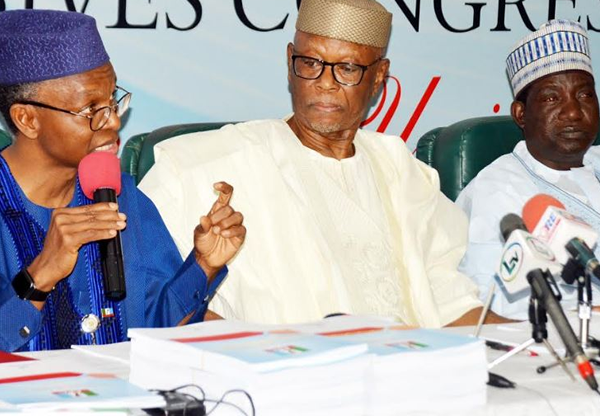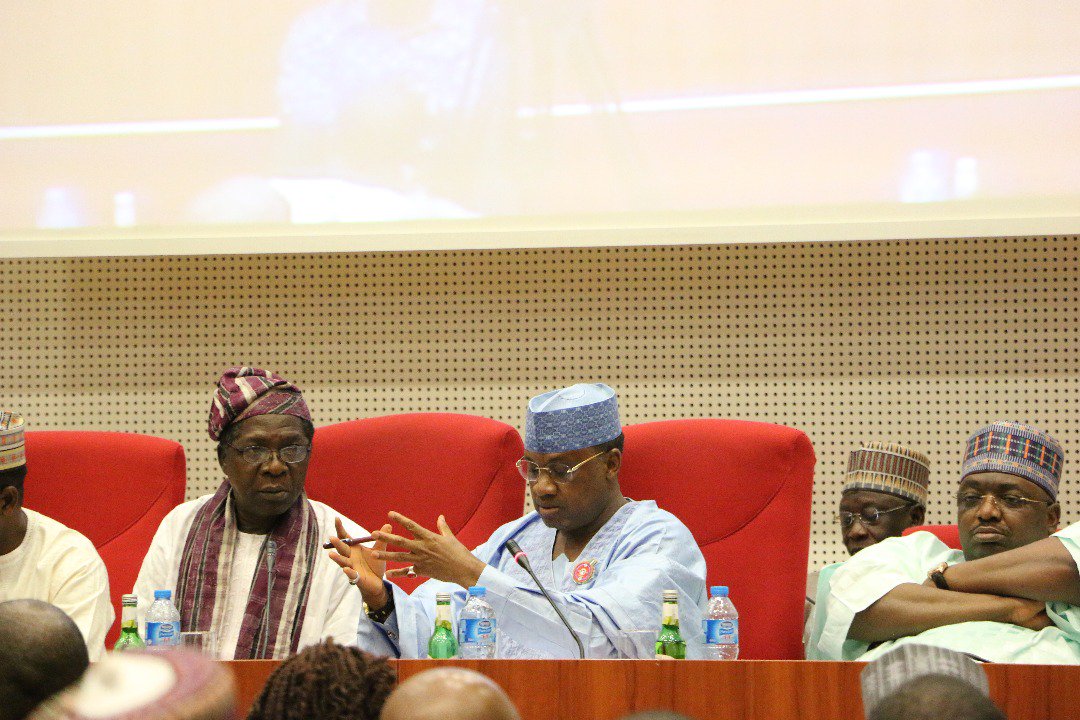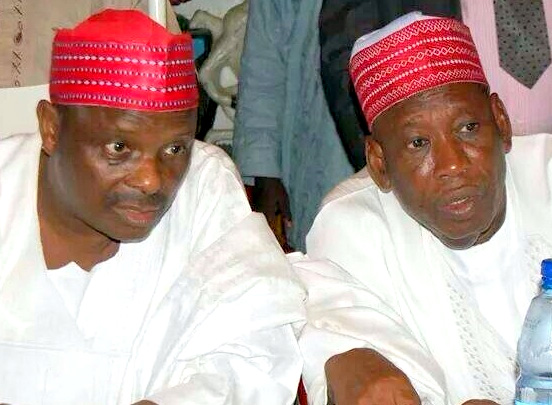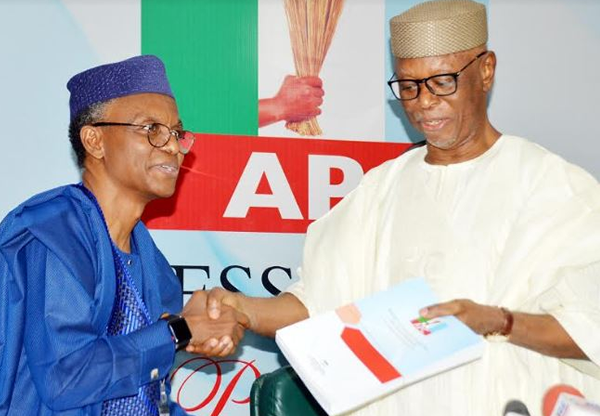From left: Chairman, APC Committee on True Federalism/Gov Nasir
El-Rufai of Kaduna State; National Chairman of APC, Chief John
Odigie-Oyegun; and Gov Simon Lalong of Jos, during the committee’s
submission of report at the APC Secretariat in Abuja
The All Progressives Congress (APC) committee on restructuring has submitted its report to John Oyegun, the party chairman.
The committee, set up amid increasing calls for restructuring of the country, believes the recommendations contained in the report “will significantly rebalance our federation” when passed by the national assembly.
The committee said voting from various regions informed its recommendations.
Below is a rundown of the report obtained by TheCable.
Advertisement
STATE CREATION
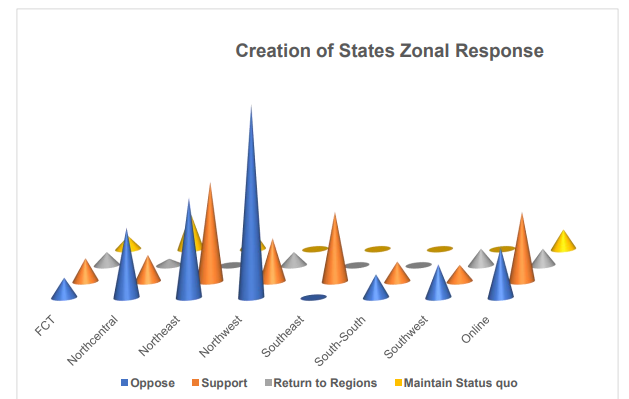
Creation of more states has remained a contentious issue in the country for many years.
Advertisement
From the data collated by the committee, 48 percent of individuals interviewed were opposed to the creation of new states while 36 percent were in support of it; seven percent advocated the return to regional system of government while nine percent were in favour of maintaining the status quo.
Opposition to the creation of states, according to the report, is strongest in the northern states and online, while respondents in the south-east were championing the creation of an additional state to achieve parity with other geopolitical zones.
In the light of the foregoing, the committee voted against creation of more states in the current dispensation “because to do so will merely create new sub-national bureaucracies and their attendant costs while reducing the share of federal statutory allocation accruing to existing and proposed new states that are already grappling with the high cost of governance.”
It also said the creation of states could “further weaken the federating units and thus run contrary to popular demands for ‘true federalism’ which the APC stands for.”
Advertisement
MERGER OF STATES
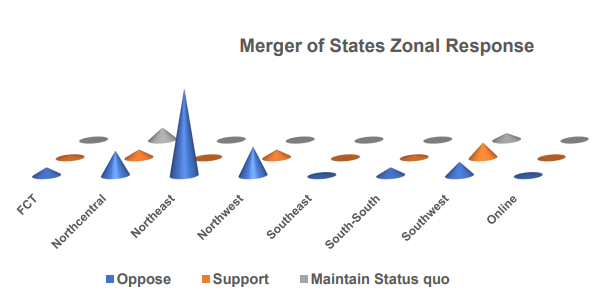
The report noted that from the findings, 78 percent of respondents were opposed to the merger of states while 16 percent supported it, and eight percent, in support of maintaining the status quo.
It said the opposition to merger of states was “very strong” in north-east, north-west, north-central and minimal in the FCT and south-south while the number in support of it in south-west is slightly above those against it.
Advertisement
Although it voted against this option, going by the consensus, it recommended the constitution should provide for legal and administrative frameworks for states that might, in future, wish to consider the option “provided this does not threaten the authority or existence of the federation.”
DERIVATION PRINCIPLE
Advertisement
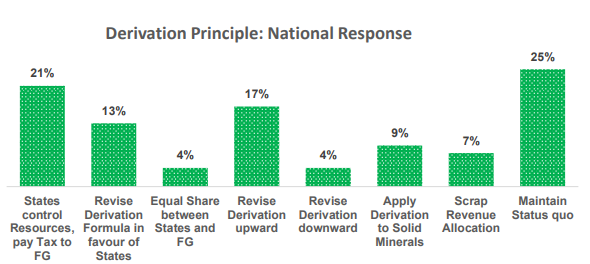
Although the report did not state the percentage of votes regarding this provision, it said there were eight different views on it, with the south-east and south-south having the least voice in support of “state control of resources and payment of tax to the FG…possibly because of the low number of memoranda from the zones.”
Advertisement
It said online responses presented the highest volume of support for this issue and that of the eight varying opinions, there were widespread support and consensus in favour of “state control of resources and payment of tax to the FG”.
In the light of the foregoing, the committee recommended that the federal government “should expeditiously review current derivation formula to reflect areas of national consensus which are adoption of ‘state control of resources and payment of tax to FG’, upward review of the current formula in favour of states and adoption of similar derivation formula in favour of solid minerals and power generation.”
Advertisement
FISCAL FEDERALISM AND REVENUE ALLOCATION
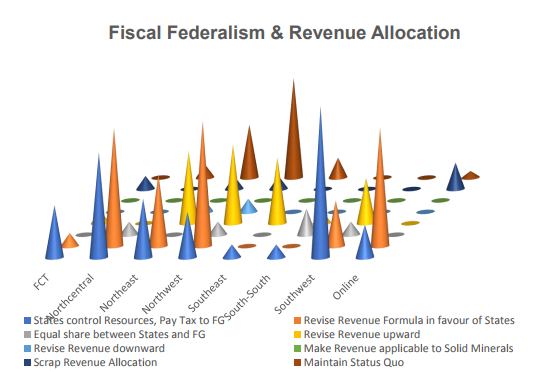
The report said there were strong support and consensus of opinion across the geographical zones over state control of resources and payment of tax to the federal government “especially in north-central, north-west, north-east, south-west and FCT.”
It also said another issue with “very strong level of support and consensus” is the revised revenue formula in favour of the state while another response with widespread acceptance is the demand to revise the revenue allocation upward.
“The strongest support for this idea came from south-west, south-east, north-west and north-east zones. Maintaining the status quo is strongly supported in north-west and north-east zones while it is marginally supported in the south-east and north-central zones,” the committee noted.
The committee said while government needs to be explicit regarding the true meaning of derivation principle and fiscal federalism and revenue allocation for better public understanding, it believes that “it would be beneficial for all, if there is an upward review of current revenue formula in favour of states.”
It, therefore, recommended that the federal government should “urgently direct the Revenue Mobilisation, Allocation and Fiscal Commission to among others fashion out a new revenue allocation formula in consonance with the provisions of the 1999 Constitution as amended, which envisages a periodic review of the formula.”
DEVOLUTION OF POWERS
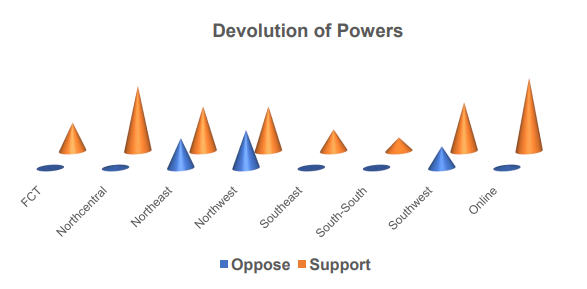
From data collated nationwide, the committee said 74 percent of respondents were in favour of devolution of powers while only seven percent opposed to it, with the remaining 19 percent offering no opinion about devolution.
It added that while there was “overwhelming” support for devolution of powers across all geographical zones, it received opposition from the north-east, north-west and south-west “even though more are still in support than those that are opposed to the idea of devolution of powers in those zones.”
While voting in favour of devolution of power to states, the committee said such would bring about “enhancing and localizing the demand side of governance and make states more accountable to the electorate.”
FEDERATING UNITS
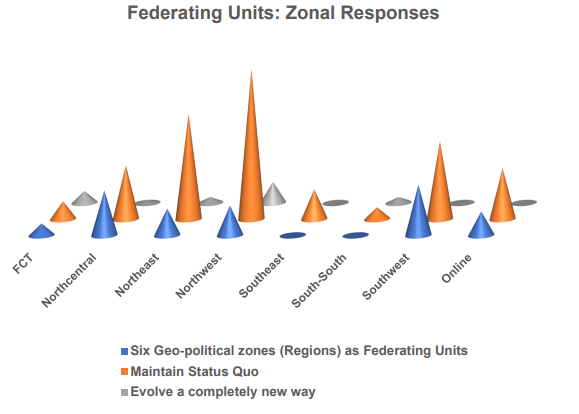
The report from the committee noted that from the general response, the two dominant views canvassed are “maintaining the status quo” i.e. the current structure of 36 states and “having the six geo-political zones (or regions) as federating units”.
It said while 68 percent of respondents were in support of maintaining the status quo, 26 percent were for having the regions as federating units while seven percent advocated for evolving a completely new system.
The zones in support of having the regions as federating units, according to the report, include the south-west north-central, north-west and north-east, while the view of retaining states as federating units was “very strong” in the north-west, north-east, south-west, north-central an among online respondents,” it added.
The committee, therefore, recommended the retention of current political arrangement for states to continue to be the units of the federation.
FORM OF GOVERNMENT
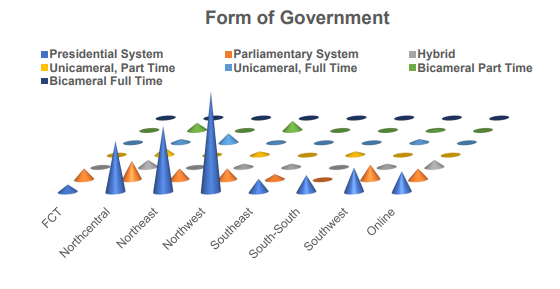
The report noted that two major responses emerged in this regard: retaining the presidential system and returning to the parliamentary system.
It added: “These two views are fairly national with retention of presidential system having stronger appeal among the stakeholders from virtually all zones of the country including online respondents.
“The other consideration is ‘return to parliamentary system’ which exists in north-central, north-east, north-west and south-west at very low level compared to the call to retain the presidential system.
“The emphasis on parliamentary system is strong in north-central and south-west, with no mention among the south-south stakeholders.”
For the overall national response, 65 percent of respondents were in favour of the presidential system, 18 percent supported parliamentary system, six percent for hybrid; three percent for unicameral part-time, four percent for unicameral full time while four per cent was for bicameral part-time.
From the foregoing, the committee recommended the retention of the presidential system of government “but has concern with corruption and high cost of governance associated with running the presidential system at national and sub-national levels. These two challenges need to be firmly addressed to ensure sustainability of governance.”
INDEPENDENT CANDIDATURE
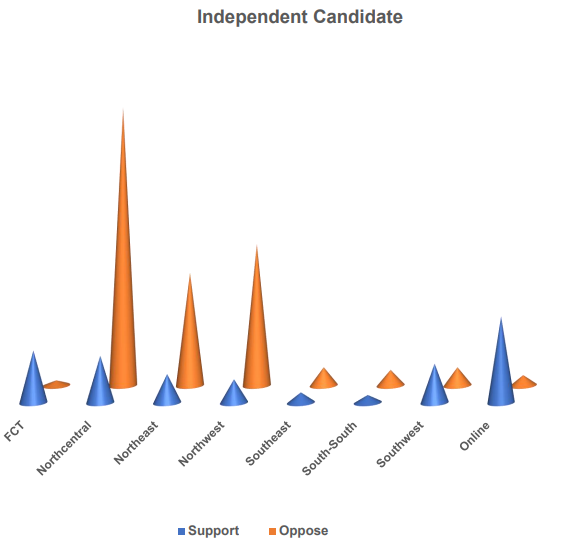
The committee said opposition to independent candidature was stronger than support for it in the three northern zones and also south-east and south-south while the south-west and FCT were in support of it.
On the bigger picture, 67 percent of respondents were against it while 33 percent were for it.
Although it recommended independent candidacy, the committee said it is necessary to introduce “strong eligibility criteria and process checks in order to prevent abuse for instance, by attention-seeking candidates who would want to create crises in the electoral process.”
LOCAL GOVERNMENT AUTONOMY
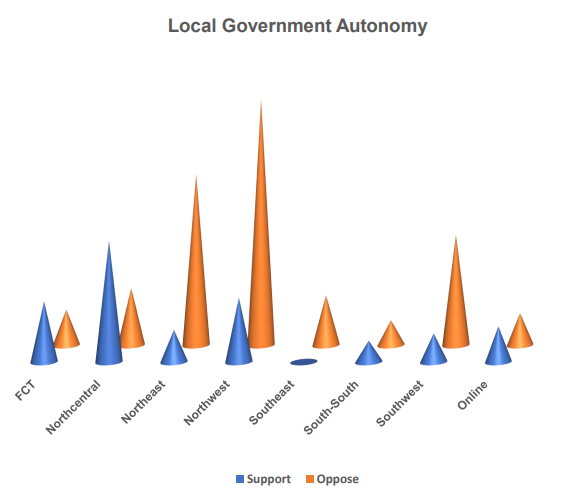
From the data it collated, the committee said 67 percent of respondents across the country were opposed to local government autonomy while 33 per ent were in support of it – “much of this due to inadequate understanding of the true meaning of federalism.”
It added that the opposition to local government autonomy is “overwhelming” in north-east, north-west and south-west.
While pointing out that the demand for local government autonomy is as a result of the “alleged interference in the management of the monies allocated to LGAs from the federation account,” it recommended that LGAs should be removed from the federal constitution and states be allowed to develop a “local administrative system that is relevant and peculiar to each respective state.”
RESOURCE CONTROL
The report noted that responses across the country show that 40 percent were in support of federal government control of natural resources, 37 percent in support of region/states control of the resources, 16 percent for joint ownership between states and FG, five percent for private ownership while two percent advocated for community ownership and control.
It added that three northern regions were strongly in support of federal government control of such resources while the FCT, south-east, south-south and south-west are for regional/state control of them.
The government said if states would be allowed to exercise control over resources in their areas, then some other legislations will have to be amended, including Petroleum Act, 2004; Nigerian Minerals and Mining Act, 2007; Land Use Act, 1978; and Petroleum Profit Tax Act, 2007.

